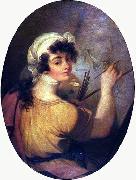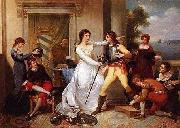Vieira Portuense Huiler la Reproduction de TableauAll Vieira Portuense Oil Paintings(Porto, 13 May 1765 - Funchal, 2 May 1805), who choose the artistic name of Vieira Portuense, was a Portuguese painter, one of the introducers of Neoclassicism in Portuguese painting. He was, in the neoclassical style, one of the two great Portuguese painters of his generation, with Domingos Sequeira. He first studied in Lisbon, later moving to Rome. He traveled through Italy, Germany, Austria and England, before returning to Portugal, in 1800. He met Swiss painter Angelika Kauffmann, from whom he seems to have received influences. He seems to anticipate some motives of the romantic painting in several of his historical paintings, like "Dona Filipa de Vilhena knighting her sons" (1801). He contracted tuberculosis, and moved to Madeira, were he died, aged only 39. He is represented at the National Museum of Ancient Art, in Lisbon, and at the National Museum Soares dos Reis, in Porto. Not to be confused with another Portuguese painter, Francisco Vieira de Matos, better known as Vieira Lusitano. |
|||

|
|||
|
|
|||
|
||||||||||||
| Vieira Portuense (Porto, 13 May 1765 - Funchal, 2 May 1805), who choose the artistic name of Vieira Portuense, was a Portuguese painter, one of the introducers of Neoclassicism in Portuguese painting. He was, in the neoclassical style, one of the two great Portuguese painters of his generation, with Domingos Sequeira. He first studied in Lisbon, later moving to Rome. He traveled through Italy, Germany, Austria and England, before returning to Portugal, in 1800. He met Swiss painter Angelika Kauffmann, from whom he seems to have received influences. He seems to anticipate some motives of the romantic painting in several of his historical paintings, like "Dona Filipa de Vilhena knighting her sons" (1801). He contracted tuberculosis, and moved to Madeira, were he died, aged only 39. He is represented at the National Museum of Ancient Art, in Lisbon, and at the National Museum Soares dos Reis, in Porto. Not to be confused with another Portuguese painter, Francisco Vieira de Matos, better known as Vieira Lusitano. |
||||||||||||
|
|
||||||||||||
| ID de tableau:: 96679 Portrait of a Woman Portrait of a Woman 1800(1800) Medium oil on canvas Dimensions 88 X 66 cm (34.6 X 26 in) cjr 1800(1800) Medium oil on canvas Dimensions 88 X 66 cm (34.6 X 26 in) cjr |
||||||||||||
|
|
||||||||||||
| ID de tableau:: 96680 Dona Filipa de Vilhena Dona Filipa de Vilhena 1801 150 x 212 cm cjr 1801 150 x 212 cm cjr |
||||||||||||
|
|
||||||||||||
|
| Artiste précédent Artiste prochain | |||||||||||
|
|
||||||||||||
|
Vieira Portuense (Porto, 13 May 1765 - Funchal, 2 May 1805), who choose the artistic name of Vieira Portuense, was a Portuguese painter, one of the introducers of Neoclassicism in Portuguese painting. He was, in the neoclassical style, one of the two great Portuguese painters of his generation, with Domingos Sequeira. He first studied in Lisbon, later moving to Rome. He traveled through Italy, Germany, Austria and England, before returning to Portugal, in 1800. He met Swiss painter Angelika Kauffmann, from whom he seems to have received influences. He seems to anticipate some motives of the romantic painting in several of his historical paintings, like "Dona Filipa de Vilhena knighting her sons" (1801). He contracted tuberculosis, and moved to Madeira, were he died, aged only 39. He is represented at the National Museum of Ancient Art, in Lisbon, and at the National Museum Soares dos Reis, in Porto. Not to be confused with another Portuguese painter, Francisco Vieira de Matos, better known as Vieira Lusitano. |
||||||||||||
|
|
||||||||||||
|
CONTACTER DES Etats-Unis |







